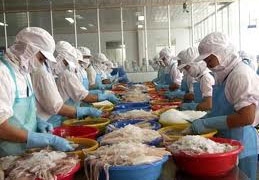Partnership deal helps drive Vietnam-Japan trade
 Tadashi Kikuchi, economic attache at the Japanese consulate general in the city, told the conference held to review two years of VJEPA that the trade had expanded by more than 20 per cent last year to $16.7 billion.
Tadashi Kikuchi, economic attache at the Japanese consulate general in the city, told the conference held to review two years of VJEPA that the trade had expanded by more than 20 per cent last year to $16.7 billion.
It topped nearly $15 billion in the first nine months of this year.
With the reduction or elimination of tariffs on several Vietnamese goods under the agreement, seafood, textile and garment, and vegetable exports have been robust.
The Vietnam Association of Seafood Exporters and Producers (VASEP) said the tariff reduction has improved the competitiveness of Vietnamese products.
Truong Dinh Hoe, VASEP general secretary, said Japan was now Vietnam's largest buyer of frozen shrimp with imports of $397 million in the first nine months.
Overall seafood exports were worth $668 million, an increase of 4 per cent over the same period last year, with tuna, cuttlefish, and octopus being the main items besides frozen shrimp.
Some other sectors like garment and textile, footwear, fruit and vegetables, electrical products and cables, and wood products have also capitalised on the preferential tariffs to promote exports to Japan, Huynh Khanh Hiep, deputy director of the Ho Chi Minh City Department of Industry and Trade, said.
The city's garment and textile exports alone to Japan were worth $445.7 million last year, a year-on-year increase of 6.2 per cent.
They jumped 34 per cent in the first three quarters of this year to $452.6 million, Hiep said.
Bui Huy Son, director of the Asia-Pacific Market Department, said the opportunities were huge under the trade agreement since Vietnamese textile and garments as well as 23 out of 30 key agricultural, forestry, and seafood items enjoy tariff breaks.
But Hiep said there are difficulties in exporting, including a lack of understanding of the Japanese market and business culture.
Many Vietnamese firms, especially small- and medium-sized, do not really understand the Japanese market, and that is why they struggled despite being very successful in the US and EU, he explained.
The technical barriers against farm produce and seafood in Japan and stringent quality, hygiene, and safety requirements are also major challenges for them, he said.
To crack the market, he said Vietnamese firms, particularly shrimp exporters, should improve their technologies to enhance quality.
Kikuchi said: "Vietnamese enterprises should establish long-term relationships with their Japanese counterparts and understand their business culture."
They must research the Japanese market and customers' tastes to know how to pitch their products and services effectively, he said.
What the stars mean:
★ Poor ★ ★ Promising ★★★ Good ★★★★ Very good ★★★★★ Exceptional
 Tag:
Tag:
Latest News
More News
- Site clearance work launched for Dung Quat refinery upgrade (February 04, 2026 | 18:06)
- Masan High-Tech Materials reports profit: a view from Nui Phao mine (February 04, 2026 | 16:13)
- Hermes joins Long Thanh cargo terminal development (February 04, 2026 | 15:59)
- SCG enhances production and distribution in Vietnam (February 04, 2026 | 08:00)
- UNIVACCO strengthens Asia expansion with Vietnam facility (February 03, 2026 | 08:00)
- Cai Mep Ha Port project wins approval with $1.95bn investment (February 02, 2026 | 16:17)
- Repositioning Vietnam in Asia’s manufacturing race (February 02, 2026 | 16:00)
- Manufacturing growth remains solid in early 2026 (February 02, 2026 | 15:28)
- Navigating venture capital trends across the continent (February 02, 2026 | 14:00)
- Motivations to achieve high growth (February 02, 2026 | 11:00)

















 Mobile Version
Mobile Version